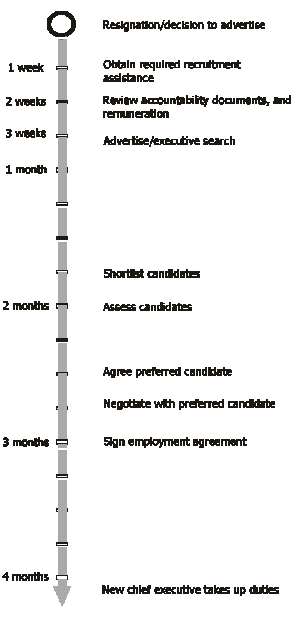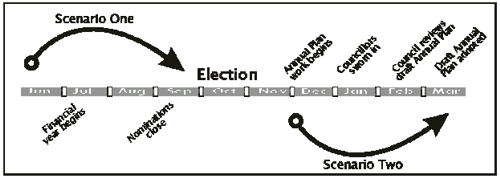Part 5: Recruiting the Chief Executive
The Importance of Doing It Well
5.1
Choosing who is to be chief executive is one of the most important decisions
that a council is required to make. The role of the chief executive as the
council’s primary adviser, senior manager, and employer of staff is critical to
ensuring that the business of the local authority is conducted lawfully,
effectively, and efficiently.
5.2
The importance of the role and responsibilities of the chief executive make it
essential that the task of recruiting the chief executive is undertaken
thoroughly and professionally. The recruitment process should give all elected
members confidence that the appointee has the appropriate knowledge, skills,
and attributes to fulfil the requirements of the position. The recruitment
process must also be fair and impartial to ensure that all applicants are treated
equally.
5.3
The recruitment process can generate conflict and division in situations where
one or more elected members:
- do not agree on how the new chief executive should be recruited;
- have a sense of being excluded from participation in the process, or feel that their participation has been restricted;
- have a limited understanding of the knowledge, skills, and attributes required of the chief executive, or fail to agree on these job requirements;
- do not agree about, or are not fully aware of, the chief executive’s role; or
- have different views on the priorities envisaged for the chief executive.
5.4
Conflict and division arising from the recruitment process can influence the
attitude of elected members towards the new chief executive, because (for
example):
- some elected members may see the successful candidate as being politically aligned with a particular faction within the council, such that they do not feel confident in seeking the new chief executive’s advice;
- the chief executive’s remuneration may be viewed as excessive;
- the subsequent performance of the chief executive may not be seen as warranting a bonus payment; and
- public comment on matters relating to the employment of the chief executive may bring the council into disrepute.
Using Consultants or Advisers
5.5
Most councils told us that they had used consultants or advisers to:
- advertise the position and seek candidates;
- determine the remuneration package to be offered;
- short-list applicants; and
- interview and assess the short-listed applicants.
5.6
Commonly, councils had negotiated directly with preferred candidates,
although some councils had engaged consultants to assist.
The Views of Elected Members and Chief Executives
5.7
We sought the views of elected members on their satisfaction with the
recruitment process, and the views of chief executives about their experiences
of the process.
Elected Members
5.8
Most mayors/chairpersons and over two-thirds of other elected members were
satisfied with the recruitment process and their participation in it. The
comments quoted below illustrate some of the ways in which elected members
participated in recruitment of the chief executive:
- Council was involved in selection process, all candidates addressed council and [councillors] recommended individually their choice to subcommittee. Consultants were hired to guide the process and interview referees.
- Took part in full council vote between the final two candidates.
- Council delegated the short-listing to a subcommittee in liaison with a recruitment agency; the agency described the process to be undertaken and council as a whole agreed to follow the process through.
- Informally asked to give an opinion of the CE.
- No involvement, not a member of the Sub-Committee, only approved recommendation at council.
- I had no involvement except a vote on delegated sub-committee’ s recommendation to full council.
5.9
Elected members suggested the following ways to improve the recruitment
process:
- A small group met the short listed candidates. I feel councillors could have had that opportunity.
- There was no real opportunity as a council to discuss job description, personal qualities etc.
- Would have liked to have seen the applications of those selected by hired advisers to be interviewed. Sub-Committee shuts out other councillors and is not open to new ideas and concepts.
- Would like council as a whole to interview short-listed candidate(s) and establish chemistry.
Chief Executives
5.10
The employment agreements for half of the chief executives had been
negotiated on the basis of their predecessor’s agreement. The rest had new
agreements.
5.11
Most chief executives reported that the council had:
- reviewed the employment agreement/contract;
- developed job specifications and personal attributes; and
- considered the remuneration range and package to be offered.
5.12
Chief executives made the following comments on their experiences of the
recruitment process:
- Process went well – deadlines were set and kept to.
- No problems apart from lack of confidentiality.
- External agent used had limited local body experience.
- Final interview with full council was well managed and challenging.
- Feedback from recruitment consultant could have been transparent, I was not provided with a copy of their report.
- Was badly managed, lengthy and did not have the required initial planning.
- Handled professionally by an experienced HR consultant.
- Poorly conducted – left me with bad feelings. Too many people involved. Poor consultant.
Our Views
5.13
We discuss in the following paragraphs the main issues that emerged from our
survey. We also suggest best practice.
Participation of Elected Members
5.14
A recruitment process in which all elected members participate, and in which
they can all have confidence, lays the foundation for a constructive and
harmonious future relationship with the new chief executive. All elected
members should agree to what recruitment process is to be used, and take
part in the council’s deliberations on position requirements, performance
expectations, and remuneration.
5.15
Some councils may find it efficient to delegate aspects of the process to a
committee made up of elected members. However, this approach should be
taken only with the full agreement of all members, and should allow all
members to take part in key council decisions on the process to be followed
and on the terms of the chief executive’s employment agreement.
5.16
The full council should agree on:
- the recruitment process, who is responsible for managing different stages, and the assistance that the council requires;
- the job description, the key result areas, the performance agreement, and the values and behaviours the chief executive will be expected to display and promote in the organisation;
- the personal characteristics, knowledge, skills, and attributes required;
- remuneration;
- the terms of the employment agreement; and
- the methods of short-listing and appointment.
Using a Consultant or Adviser
5.17
In many cases, elected members will not have experience of, or training in, the
role of employer. Therefore, the council may engage a consultant or adviser to
help it recruit the chief executive. Using a consultant or adviser can provide
elected members with a valuable source of advice, and provide assurance
about the recruitment process.
5.18
The benefits of a thorough and professionally-managed recruitment process –
that results in appointment of a suitable chief executive who will meet the
council’s needs – may well outweigh the costs of engaging a consultant or
adviser.
5.19
Using external assistance can also add an important perception of
independence and impartiality – helping to avoid suggestions that factions
within the council have unduly influenced the recruitment process.
5.20
A consultant or adviser can help the council to formulate:
- performance expectations, key result areas, and the values that the chief executive is expected to display and promote; and
- competencies – including qualifications, experience, knowledge, skills, and attributes.
5.21
A council should give careful thought to its choice of a recruitment
consultant or adviser. The person should have the confidence of all
elected members and be able to demonstrate their ability to obtain the
best outcome for the council. The person should also have relevant
experience in recruiting senior managers, and an understanding of:
- the local government sector;
- the statutory responsibilities of a local government chief executive; and
- the community’s expectations of public bodies.
5.22
A council should avoid using its own staff to manage the recruitment
process where they may face conflicting loyalties – especially when the
incumbent chief executive is applying for the position. Nevertheless, staff
may be able to advise the council on:
- the attributes sought from a consultant or adviser and the best way to choose that person;
- the role and terms of reference for the consultant; and
- the performance expected of the consultant – including the timetable, key milestones, and reporting requirements to the council.
5.23
The council and the consultant should agree on the terms of the
engagement before embarking on the recruitment process.
Determining the Chief Executive's Remuneration
5.24
The council needs to ensure that the remuneration package for the chief
executive:
- is affordable;
- is appropriate to the position; and
- will attract suitable candidates.
5.25
The Local Government Act requires annual reports of local authorities to
contain details of the chief executive’s remuneration. The council should be
confident that it can publicly justify the remuneration package negotiated
with the successful applicant.
5.26
Councils should consider taking independent advice (including on
external market benchmarks) to confirm the appropriateness of the
remuneration package and terms of appointment for the chief executive.
Handling Confidential Information
5.27
Every elected member (and anyone else who has access to it) should treat
as confidential all personal or other sensitive information provided or
obtained in the course of recruitment.
5.28
Maintaining confidentiality reflects on:
- the credibility and integrity of the process and its outcome; and
- the council’s reputation as an employer.
Deciding When to Recruit
5.29
It can take at least four months to recruit a chief executive. This length of time
can be a problem when it coincides with local elections. Figure 1 on the
opposite page illustrates a typical timeline.
5.30
Where possible, a council should avoid recruiting a chief executive in the
few months immediately preceding or following local elections.
Figure 1
Typical Timeline for Recruiting a Chief Executive

5.31
Figure 2 below illustrates two possible scenarios that can arise when a chief
executive appointment is made during or close to local elections. Both
scenarios show how the outcomes of the recruitment process may be
compromised by changes resulting from the election.
5.32
Scenario 1 illustrates a situation in which recruitment takes place a few
months before an election. The new chief executive is appointed by a council
which is nearing the end of its term of office. A possibility is that newly
elected members regard the new chief executive:
- as a product of, and associated with, the previous council; and, therefore
- with suspicion and distrust.
5.33
In Scenario 2, recruitment takes place after an election. In this scenario an
incoming, newly elected council must appoint a new chief executive without
having had the opportunity to formulate its own objectives and plans for the
local authority. Nor will such a council have had the time to determine its
requirements for, and expectations of, the chief executive. Having been in
office for only a short time, the council may not be well placed to select the
most suitable applicant for the position.
5.34
We suggest that councils consider the most appropriate time to recruit a
new chief executive, avoiding where possible periods immediately
preceding or following an election.
Figure 2
Avoiding Election Time When Recruiting

